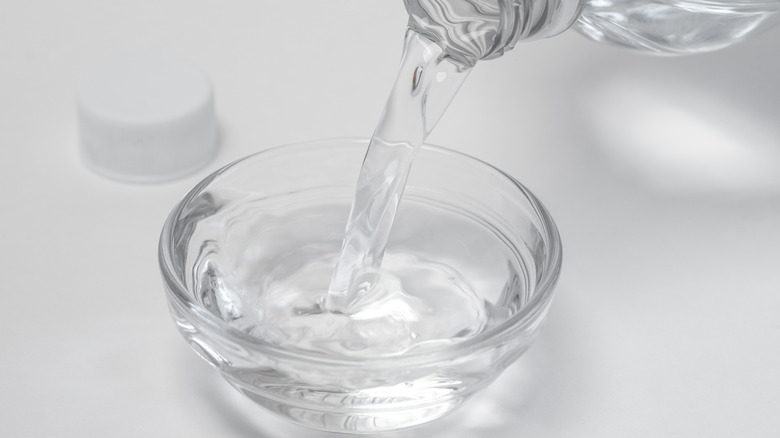The Popular Household Product That Wipes Out Dead Rodent Smells
When dealing with a rat infestation, it isn't uncommon to come across pungent dead rodent smells. The stench is a headache- and nausea-inducing cocktail of sulfur dioxide, methane, and other hydrocarbons released by the critter's decomposing body. The odor will worsen the longer the body is left to fester. It'll be especially bad if the weather is hot and humid (speeding up decomposition) and the dead pest's size is significant. But don't worry. You can wipe out dead rodent smells with a popular household product: distilled white vinegar.
However, the first step is to locate the dead body and dispose of it. So, don your rubber or plastic gloves and a face mask to keep yourself from coming in contact with the disease-causing bacteria. Next, follow your nose to locate the dead critter — as unpleasant as it sounds, it's the easiest way. Once you find the dead rodent, double bag the body in a plastic bag, seal it, and take it out to the trash immediately. Disinfect the contact areas by cleaning up gross mouse droppings and chewed-on rubbish like documents or wires. They may be important, but unless you want to pay homage to the dead and let harmful bacteria multiply, it's best to discard them in a plastic bag. Remember, finding the body won't always be easy since it could be in your walls, under floorboards, or in air vents. Don't hesitate to contact the pros and leave it to them in such circumstances.
Distilled white vinegar is your knight in shining armor
Once you dispose of the body and disinfect the contact areas, wash your gloved hands with soap and water. Now, repeat this process after taking the gloves off. To remove the lingering odor, throw open the windows and turn on the fans to improve the room's ventilation. Extra table and stand fans won't hurt, either. Follow this up by filling multiple plastic cups (or bowls) with distilled white vinegar and placing them around the room.
Distilled white vinegar isn't just an ideal cleaning agent. It's an excellent deodorizer, too. The acetic acid molecules easily cling to the odor-causing particles and will overpower the smell left behind by the dead rodent and neutralize it. Better yet, you won't have to worry about the sour fragrance of vinegar. Sure, vinegar has a strong smell straight out of the bottle, but it's important to remember that its molecules vaporize quickly in their quest to find other particles to cling to, leaving behind no scent. However, vinegar's stench might attract gnats before it evaporates, so be prepared for them in case they sneak into your house. Also, don't make the mistake of using air fresheners. At best, they'll mask, not eliminate, the dead rodent smell. At worst, the chemically produced fragrance will react with the reeking odor in the air and give rise to a worse smell.

